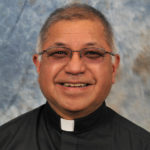
Pope Francis released his now-prescient message for World Day of Peace 2021 a month before the assault on Congress. Sadly, our country failed to heed his advice, but we must make the time to do so now. His message offers a way forward for us, as children of the same God. A God who as Peter says in Acts 10:34-38, “shows no partiality.”
The Holy Father began his letter addressing the COVID-19 crisis, which “aggravated deeply integrated crises” coupled with a “surge in various forms of nationalism, racism and xenophobia, and wars and conflicts that bring only death and destruction in their wake.”
He was speaking from a global perspective, but the devastating violence inside the U.S. Capitol on Jan. 6 symbolized a microcosm of our basest instincts. We have begun a new year, let us resolve to embark on a journey toward “A Culture of Care on a Path to Peace,” the title of Pope Francis’ 2021 message.
The heart of the church’s social doctrine Pope Francis said, “can serve as a ‘grammar’ of care: commitment to promoting the dignity of each human person, solidarity with the poor and vulnerable, the pursuit of the common good and concern for the protection of creation.”
Promoting the dignity of each human person means just that. We cannot exclude anyone — the unborn or the imprisoned. ‘“Person always signifies relationship, not individualism; it affirms inclusion, not exclusion, unique and inviolable dignity, not exploitation.’… Human rights derive from this dignity, as do human duties, like the responsibility to welcome and assist the poor, the sick, the excluded, every one of our ‘neighbors, near or far in space and time,’” the pope said.
Some Catholics fear for the rights of the unborn in the Biden Administration, which takes office Jan. 20. Being fearful does not change hearts. Respectful, persistent dialogue does. Continue to advocate for laws that protect life from womb to tomb. Keep track of these issues through the Iowa Catholic Conference (iowacatholicconference.org) and the U.S. Conference of Catholic Bishops (usccb.org).
At press time, our federal government was preparing to execute three individuals within a five-day span. Speakers at a virtual public dialogue Jan. 8 on capital punishment co-sponsored by Catholic Mobilizing Network and Georgetown University’s Initiative on Catholic Social Thought and Public Life underscored the value of every human life, including those condemned on death row. Bishop Daniel Flores of Brownsville, Texas, noted that the dignity of every human life challenges the faithful to reflect on what it means to love human life when it is difficult to do so. Pray for an end to capital punishment at the federal level and in states that still permit it. Visit the Catholic Mobilizing Network (https://tinyurl.com/y2gd98nt) to oppose the executions.
Pope Francis says in his peace message that “Every aspect of social, political and economic life achieves its fullest end when placed at the service of the common good … ‘the sum total of social conditions which allow people, either as groups or as individuals, to reach their fulfillment more fully and more easily.’”
Serving the common good means educating ourselves about these issues and contacting our state legislators and members of Congress (www.usa.gov/elected-officials) to pass laws that support a living wage, affordable housing, fair taxes, school funding, good stewardship of the earth and more.
In our state, the 89th Iowa General Assembly began Jan. 11. Gov. Kim Reynolds was scheduled to present her budget and the Condition of the State message to the Legislature on Jan. 12. Go to the Iowa Catholic Conference (ICC) website to review the legislative principles. Among issues that the ICC staff plans to address with legislators: additional state support for parental choice in education, legislation to protect the economic and physical security of workers, racial profiling, and a proposal to clarify that Iowa’s Constitution does not contain a right to an abortion. ICC Executive Director Tom Chapman asks us to pray for the legislators and their families.
“Particularly during a pandemic, it is difficult for them to be away from their families during the week.”
Cultivating a culture of care requires us to work individually and collectively to “overcome the many existing social inequalities,” Pope Francis says. He views the involvement of women — in the family and in every social, political and institutional sphere — as essential to this work.
An examination of conscience, personal and communal, is in order. It should include accountability for those who have done grave damage to our core principles of peace, civility and the rule of law. “We need to stop and ask ourselves what has led our world to see conflict as something normal, and how our hearts can be converted and our ways of thinking changed, in order for true peace in solidarity and fraternity,” the Holy Father says.
Let us begin together, to cultivate a culture of care.
Barb Arland-Fye, Editor
arland-fye@davenportdiocese.org











